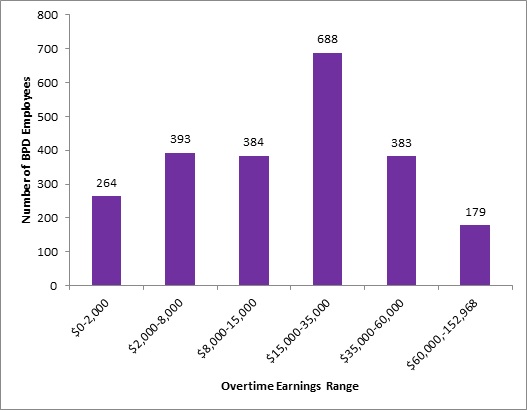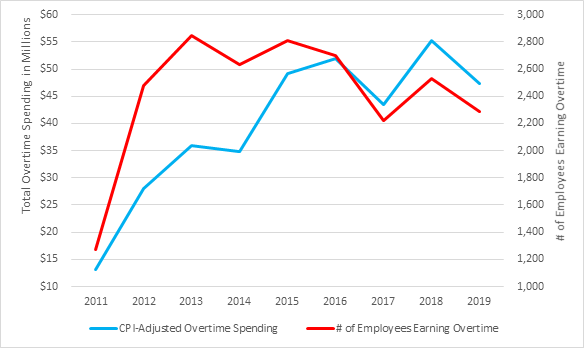June 9, 2020
By Matthew E. Kahn and Mac McComas
Baltimore City is facing a budget deficit of $42 million at the end of fiscal year 2020 due to the unexpected COVID-19 pandemic that caused both a shortfall in revenue and an increase in spending related to coronavirus protection measures. City officials will have to make difficult choices to account for the $103 million in lost revenue. As the City Council begins to review the proposed $3 billion operating budget and holds public hearings, they face increased calls to defund the Baltimore Police Department (BPD), whose proposed budget of $557.6 million for the upcoming fiscal year includes a $21 million increase over the previous year.
The BPD has struggled to keep within its overtime budget in recent years, regularly spending tens of millions of dollars over budget despite continued calls for accountability. In 2019, the BPD spent $53.5 million on overtime (Calculated as the sum of gross pay minus annual pay for those employees whose gross pay was higher than their annual pay.) Our recent report highlighted that large amounts of overtime are driving public sector pay inequality, especially in the BPD. The histogram below shows the number of employees by the amount of overtime earned. In FY2019, 76% of BPD’s 2,293 employees earned overtime, with a median of $16,931. A total of 269 employees or 9% of BPD employees earned more in overtime than the median household income of $51,000 in Baltimore City in 2018.
Figure 1: Number of Employees by Overtime Earnings, Baltimore Police Department, FY2019

As shown in Figure 2, the BPD increasingly relied on overtime from FY2011 to FY2019. The Consumer Price Index adjusted spending on overtime grew from just over $13 million in FY2011 to a height of over $55 million in FY2018. While the number of BPD employees earning overtime more than doubled from 1,271 in FY2011 to 2,850 in FY2013, a decline in the number thereafter did not correlate with a reduction in total overtime spending. This is due to an increasing number of overtime hours and pay going to a select few BPD officers, as the top overtime pay to a BPD employee grew from $100,000 in FY2013 to over $150,000 in FY2019, increasing in amount every year. The increasing use of overtime has prompted concerns of a lack of oversight in the police department as many officers exceed overtime limits.
Figure 2: Total Overtime Spending and Number of Employees Earning Overtime, Baltimore Police Department, FY2011 to 2019

As the City of Baltimore charts a new path forward with a change in the mayoral administration, city comptroller, city council president, and several new city council members, fiscal oversight and government accountability will be more important than ever.

